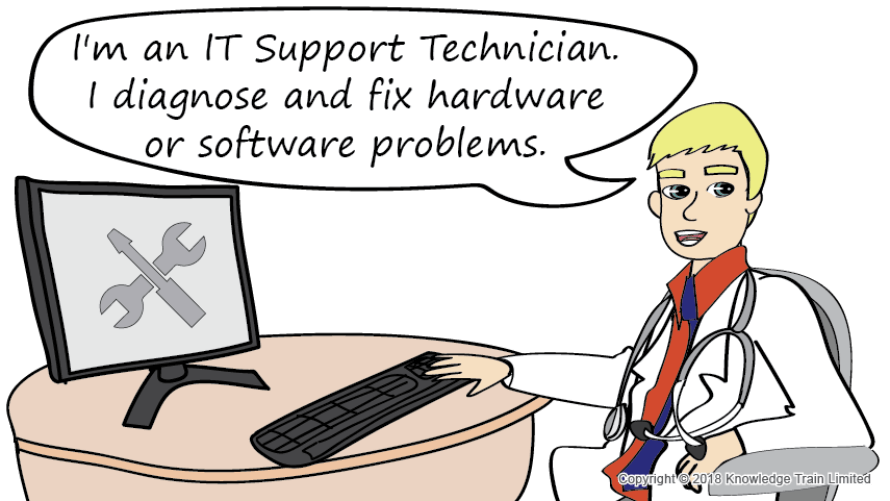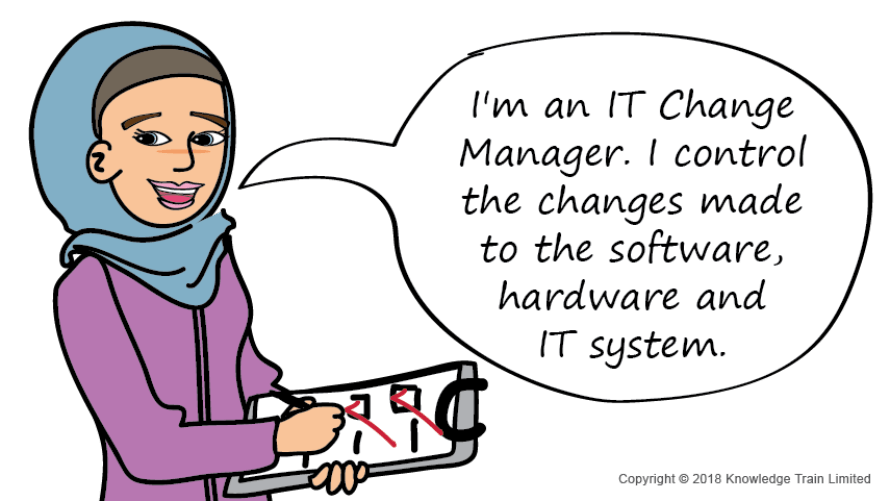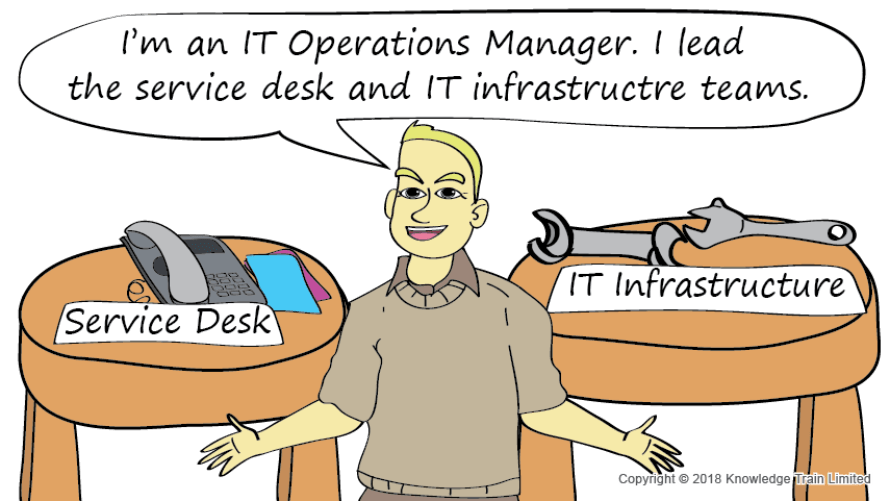
Introduction

What is ITSM?
ITSM stands for IT service management and ITSM teams or individuals perform a vital function within organisations. They focus on managing the development, design and delivery of effective IT services, either in-house or to meet customer needs. ITSM staff achieve this by ensuring the technology, people and processes match the requirements of their organisation or customer[1].
To help manage these strategies, ITSM teams normally use best practice methods such as ITIL. You’ll find ITIL very commonly mentioned on job descriptions. This is because ITIL is the most widely adopted ITSM method in the world, used by companies like IBM, Microsoft, Boeing, Sony and Barclays Bank[2]. You can learn the ITIL method by doing an accredited ITIL Foundation course.
As the IT world moves towards automation and closer collaboration between IT service and IT development departments, the benefits of new movements such as DevOps are also being realised by ITSM teams[3]. With the explosion of hacking and data breaches, cyber security is also becoming vital for organisations, so methods such as RESILIA are becoming very useful too[4].
What ITSM jobs are available?
According to AXELOS, the authors of ITIL, there are many different ITSM roles which are available for people with ITIL certification [5]. You will also find that some ITSM jobs are technical, whereas some are more business orientated.
Entry level ITSM jobs, like the Service Desk Technician and IT Project Support roles, are a good starting point for further progression into a management role, such as the Service Desk Manager or Project Manager. You can also progress into cyber resilience and business management roles.
If you have technical knowledge or experience as a developer, you can start an IT service management career by entering an IT Support Technician role or IT Architect role. From there, you can move onto specialised support and project management roles.
Top level roles in ITSM include the Programme Manager, Chief Information Security Manager, Chief Information Officer or Chief Technology Officer. You can also become a Business Analyst, Release Manager or IT Configuration Manager.

How do I start an ITSM career?
As mentioned above, the main entry level ITSM jobs are the Service Desk Technician and IT Project Support roles. For people with more technical knowledge (and experience) making the move into IT service management can be done via the IT Support Technician or IT Architect roles.
Let’s look at these roles in more depth.

Common ITSM job roles
Service Desk Technician
Average salary: £16,000 to £35,000 per year
Sometimes called a Help Desk Technician or Support Technician, this ITSM job involves helping users with software or hardware problems. They are the first point of contact for users, who will contact the technician via phone, email or live chat. Technicians might provide support in-house for an organisation’s employees, or they might provide support for a company’s customers.
To enter this ITSM role, you will need effective communication skills, sound understanding of the products you’re supporting, a customer-driven approach and good problem-solving skills. A degree isn’t necessary, but solid computing knowledge, customer service experience and maybe a college course will look good on your CV. You can also do apprenticeships[6].
How you can progress
After gaining experience within this role, you can progress onto higher level ITSM jobs, such as the Application Support Analyst, Service Desk Manager or IT Project Manager roles. Professional ITSM qualifications, especially ITIL Foundation, will help you enter any of these higher level ITSM jobs. PRINCE2 and AgilePM can help you get into the IT Project Manager role.

IT Project Support
Average salary: £27,500 per year
This ITSM role involves providing administrative support to the project or programme team. You will also be involved in basic project management. This is a back office role, not customer-facing. There is a lot of data collection and file management involved, and it provides a solid starting point for anyone wanting to be an IT Project Manager.
According to IT Jobs Watch, IT Project Support roles can around £27,500 in the UK [7]. Good organisation skills are a definite plus, as you’ll be working with files and documents. People with some experience in an office environment will stand a better chance of entering project support[8]. A degree isn’t necessary, but professional certification, like PRINCE 2 or Agile Project Management , will make you stand out from the rest.
How you can progress
As mentioned above, this ITSM job is a fantastic way to become an IT Project Manager, as you will gain on-the-job experience. If you would prefer to manage front-line staff in a customer service environment, you can also progress into a Service Desk Manager role, in which case you will need strong computing knowledge and ITIL certification.

IT Support Technician
Average salary: £17,000 to £35,000 per year
This is a more technical ITSM job as it involves identifying and fixing hardware and software issues. Such issues will normally be escalated by service desk staff, and if it’s happening right there and then, will need fixing promptly. This adds a fair bit of pressure to the role. This ITSM role also requires excellent IT knowledge – your day might involve maintaining networks, running tests to see whether issues have been fixed, installing new software or upgrades, replacing hardware or creating new user accounts.
According to Prospects [9] IT Support Technicians can earn anything up to £35,000 a year in the UK. A degree isn’t necessary, but qualifications can give you an advantage. Getting ITIL certified can help you provide better support and continually improve your support skills. You can also complete Microsoft, Cisco, Linux or Oracle training to prove your technical expertise. Gaining work experience is highly recommended.
How you can progress
You can develop this career by specializing in a certain area of IT and becoming either an Application Support Specialist, Hardware Support Specialist or Network Support Specialist. Again, ITIL can help you enter any of these roles. A qualification called RESILIA is also beneficial for the Network Support Specialist role. This will equip you with cyber resilience skills.

IT Architect
Average salary: £57,806 per year
IT Architects form a crucial part of the ITSM team. In consultation with the organisation’s stakeholders, they are responsible for designing IT solutions that increase efficiency, reduce costs or solve business problems. They often specialize in a certain area of IT and often lead development teams. Quite a bit of research and analysis will be required, alongside good planning and leadership skills.
According to PayScale, IT Architects are some of the best-paid jobs in ITSM earning almost £60,000 a year in the UK [10]. To become an IT Architect, you will need to have experience working in a development or testing role. An architect role is also easier to get into if you have a computer science or business information systems degree[11].
ITIL qualifications can certainly help you enter this ITSM job, especially in terms of service design, strategy and planning. If you choose to specialize in cyber resilience, RESILIA is also a good qualification. As you will be involved in projects, a qualification such as APMG’s AgilePM or PRINCE2 may also be useful.
How you can progress
Typically, you can progress from this role to IT Project Manager, IT Programme Manager or Chief Technology Officer roles. Again, APMG’s Agile PM and PRINCE2 can help you to get into a project management role, and MSP qualifications can help you get into a programme management role.

ITSM managerial roles
The wonderful thing about an IT service management career is the excellent career progression. After gaining experience in one of the previously mentioned ITSM jobs, you can develop your career further within ITSM by specializing or moving into a managerial position.
For example, Service Desk Technicians commonly move into Service Desk Manager roles, and IT Project Support normally step up into IT Project Manager roles. These are the logical next steps. However, some Service Desk Technicians choose to specialize and become an Application Support Specialist. Going down this path opens up ITSM career opportunities in cyber resilience and security.
Let’s take a closer look at the ITSM jobs you can progress into.

Service Desk Manager
Average salary: £45,000 per year
This is a common next job after being a Service Desk Technician. It involves daily management of the service desk team and ensuring customers leave satisfied. The Service Desk Manager achieves this by coaching and motivating their team, and ensuring effective processes are in place. They may also be involved in client management. ITIL and RESILIA qualifications can help you enter this role.
How you can progress
After this job, you can enter an IT Change Manager, IT Operations Manager or Service Level Manager role.

IT Change Manager
People performing this role will manage, track and control changes to the software, hardware or IT system. They earn on average £55,000 per year according to JobsWatch. They authorize numerous small changes and ensure they are implemented properly, whilst large changes are normally discussed with the Change Advisory Board. The IT Change Manager is also responsible for establishing baselines and tracking revisions, understanding who changed what, and when.
This role requires superb organisation and management skills. ITIL qualifications will help you enter the role, and you will also need experience using configuration management tools. After this role, you can specialize and become either a Release Manager or IT Configuration Manager. These two ITSM jobs delve deeper into IT infrastructure change, looking at the management of releases and configurations.

IT Operations Managers
Are responsible for leading the service desk and IT infrastructure teams, to ensure services and technologies are functioning properly. They monitor software/hardware and develop processes to ensure problems are solved quickly[12]. They typically earn around £60,000 per year. ITIL qualifications are very helpful for this role, and RESILIA can help with boosting cyber resilience skills. You can progress and become a Business Relationship Manager or Chief Information Officer – two very senior ITSM roles.
Service Level Managers
This is another high salaried position, with earnings of around £60,000 per year. Service Level Managers are effective communicators, responsible for designing and negotiating services that align with a customer’s service level targets. These services get outlined in contracts called Service Level Agreements (SLAs). They also monitor and analyse service levels. Again, ITIL qualifications will help you enter this role. After this role, you can become a Business Relationship Manager or Supplier Relationship Manager – two roles that also focus on the business and people side of ITSM.

IT Project Manager
Average salary: £25,000 to £70,000 per year[13]
This is the next logical ITSM job after gaining experience in IT Project Support or as an IT Architect. You’ll need to be an effective communicator and leader, as you’ll be responsible for leading, planning and managing IT projects. ITIL certification would benefit anyone entering this role, as would Agile PM or PRINCE2.
How you can progress
After this role, you can enter an IT Programme Manager or Business Relationship Manager role.

IT Programme Managers
Lead and plan programmes of change involving IT. This involves managing the risks, budgets, priorities and quality of multiple projects. It is therefore a top level ITSM job, due to the amount of experience and skill required. They earn on average £75,000 per year. Gaining the MSP qualification, along with ITIL certification, would benefit those interested in entering this role.

Business Relationship Managers
Earn on average around £50,000 a year and could be considered senior sales staff. They build relationships between the organisation and customers, making sure IT services meet the needs of the customer. They understand the IT services offered, and how they can help the customer. It is a role requiring good people skills and the ability to build trust. ITIL certification will help you enter this ITSM role, especially in terms of service strategy and improvement. The next step after this job would be a Supplier Relationship Manager.
Application Support Specialist
Those with experience in technical ITSM roles, such as IT Support Technicians, can progress into this role easily. It involves focusing on applications and fixing issues when escalated from the service desk. They often use their expertise to train staff and advise the organisation too. Alternatively, IT Support Technicians with hardware or networking expertise can move into a Hardware or Network Support Specialist role instead. It depends what you want to specialize in. ITIL certification is essential for these roles, alongside excellent technical knowledge.
How you can progress
After these roles, you can enter the cyber security ITSM career path. The next step would be as a Security Analyst.

Security Analysts
Earn on average £50,000 per year and perform a vital role within ITSM. They use software and diagnostics to prevent security breaches, designing solutions to strengthen the organisation’s network against attacks. They will have a deep understanding of cyber security and cyber resilience tools. They might also be involved in security training and defining the organisation’s security policies. ITIL certification will help you enter this role, but RESILIA certification is highly recommended too.
After this role, you can progress into one of the numerous cyber security roles within ITSM, such as a Cyber Resilience Manager, Cyber Resilience Consultant, IT Security Architect, Cyber Resilience Auditor. Again, RESILIA and ITIL will come in very useful for these ITSM job roles.
Top-tier ITSM jobs

The highest ITSM roles would be the Chief Technology Officer, Chief Information Officer and Chief Information Security Manager. These are all executive roles which would see you making strategic decisions for your organisation.
The Chief Technology Officer effectively chooses the right technology for the business; the Chief Information Officer defines the organisation’s overall IT strategy, and the Chief Information Security Manager defines the overall security strategy.
All are performed by experts with a great deal of experience and the right ITIL qualifications, having worked for some time in another ITSM role previously.
Summary
As you can probably tell after reading this ebook, ITSM roles are varied. Some require technical knowledge, whilst some focus more on the business side. However, it is an easy field to enter, provided you start small and get the right qualifications and experience.
It goes without saying that ITSM will evolve as the IT world moves towards increased automation and advanced technology. There’ll be new tools and skills to learn, plus new processes to adapt to. It is therefore wise for current/aspiring ITSM professionals to prepare for these changes.
Those in the ITSM industry generally agree that artificial intelligence, automation and machine learning will all affect ITSM roles. This new technology will increase the need for risk management skills and knowledge of automation tools. Critical thinking and creative skills will become more desirable as automation and AI free up people’s time. Cyber-attacks will also continue to be a threat, making cyber resilience skills highly desirable too.
To cope with these changes, many organisations are adopting DevOps. This approach advocates closer collaboration between IT services and IT development teams, along with continuous delivery and the use of automation tools. This all enables DevOps organisations to deliver high-quality IT solutions quickly, which keeps the customer happy and leads to increased revenue.
Alongside gaining ITIL certification, it is highly recommended that current/aspiring ITSM professionals learn about DevOps, either on a course or by reading a book. Learning automation tools, such as Chef and Puppet, is also recommended for certain roles, especially IT Architects. For cyber resilience roles, you might want to learn about DevSecOps.
Bibliography
[1] TechTarget. (2018). ITSM (IT Service Management) definition. Available: http://searchitoperations.techtarget.com/definition/ITSM. Last accessed 8th November 2018.
[2] AXELOS (2013). ITIL®: The Basics White Paper. Available: https://www.axelos.com/case-studies-and-white-papers/itil-the-basics-white-paper Last accessed: 8th November 2018.
[3] TechBeacon (2018). The state of ITSM: Top trends and challenges for 2018. Available: https://techbeacon.com/state-itsm-top-trends-challenges-2018 . Last accessed: 8th November 2018.
[4] AXELOS (unknown). What is RESILIA? Available: https://www.axelos.com/resilia/what-is-resilia . Last accessed: 8th November 2018.
[5] AXELOS (unknown). ITSM Careers Path. Available: https://www.axelos.com/enhance-your-skills-with-axelos/career-paths/itsm-careers-path . Last accessed: 8th November 2018.
[6] National Careers Service (2017). IT Support Technician. Available: https://nationalcareersservice.direct.gov.uk/job-profiles/it-support-technician . Last accessed: 8th November 2018.
[7] IT Jobs Watch (2018). Project Support Officer average salary. Available: https://www.itjobswatch.co.uk/jobs/uk/project%20support%20officer.do . Last accessed: 8th November 2018.
[8] Arras People (2015). What does a project support officer do? Available: https://www.arraspeople.co.uk/camel-blog/pmo/what-does-a-project-support-officer-do/ . Last accessed: 8th November 2018.
[9] Prospects (2017). IT technical support officer. Available: https://www.prospects.ac.uk/job-profiles/it-technical-support-officer . Last accessed: 8th November 2018.
[10] PayScale (2018). Information Technology (IT) Architect Salary (United Kingdom). Available: https://www.payscale.com/research/UK/Job=Information_Technology_(IT)_Architect/Salary . Last accessed: 8th November 2018.
[11] Prospects (2017). How to become a technical architect. Available: https://www.prospects.ac.uk/jobs-and-work-experience/job-sectors/information-technology/how-to-become-a-technical-architect . Last accessed: 8th November 2018.
[12] The Nest (unknown). The Difference Between an IT Manager & an IT Operations Manager’s Job Description. Available: https://woman.thenest.com/difference-between-manager-operations-managers-job-description-15144.html . Last accessed: 8th November 2018.
[13] National Careers Service (2018). IT Project Manager. Available: https://nationalcareersservice.direct.gov.uk/job-profiles/it-project-manager . Last accessed: 8th November 2018.
